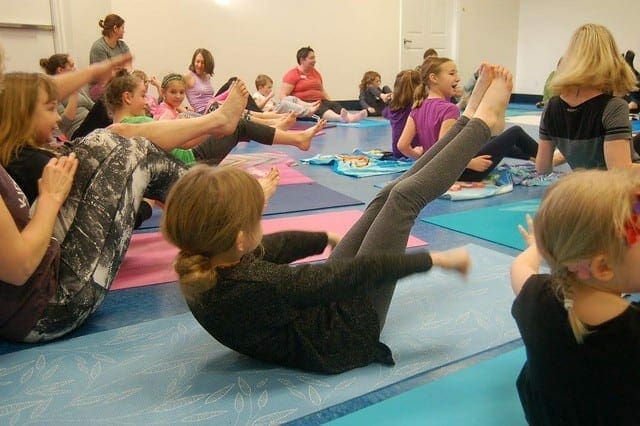Many of us have heard that yoga is a science. It is not Earth Science, not Rocket Science, not Geology, but is no-doubt linked to human well-being. This link is through biology, the study of living organisms and to chemistry or reactions in the brain and systems of the living body. Children may find the phrase “the Science of Yoga” difficult to understand since in many cultures, the mention of “science” brings about images of laboratories, technicians in white lab coats and protective googles with microscopes or beakers of steaming, boiling liquids. How then, do we get children to understand the Science of Yoga? Is there a way to help children understand that what they do on the yoga mat might be just as important to understanding life as the stereotypical scientific laboratory?
 Maybe at this point even you are wondering how yoga is a science. Scientific studies have proven that yoga is beneficial for humans, and not just the hatha or postural yoga, but also the meditation and mindfulness techniques that yogis embrace to deal with life’s challenges. Does that make yoga a science? Yes. We can explain to children that yoga releases tension in our bodies, leading to heightened happy feelings or “endorphin levels.” The release of brain chemicals might be harder to explain to children than showing them an actual science experiment, but linking physical euphoria to exercise science is a great way for children to start understanding how yoga directly benefits the body and the mind.
Maybe at this point even you are wondering how yoga is a science. Scientific studies have proven that yoga is beneficial for humans, and not just the hatha or postural yoga, but also the meditation and mindfulness techniques that yogis embrace to deal with life’s challenges. Does that make yoga a science? Yes. We can explain to children that yoga releases tension in our bodies, leading to heightened happy feelings or “endorphin levels.” The release of brain chemicals might be harder to explain to children than showing them an actual science experiment, but linking physical euphoria to exercise science is a great way for children to start understanding how yoga directly benefits the body and the mind.
Putting all scientific studies aside, most yogis would agree that regular practice of yoga helps one to achieve a peaceful state. Traditional yoga also stipulates healthy eating habits often featuring diets low in saturated fats and free from meats. Many cultures around the globe have ways of explaining this phenomenon, that increased physical activity and proper nutrition connect to one’s overall well-being.
Why else would all mothers and caregivers constantly nag at kids to do things such as, “go outside and play” and “eat your vegetables”? Do you believe in the old adages, “You are what you eat” and “Your health is your wealth”? If you do believe them, do you know why we as a collective human society say these things? There is actually a scientific reason: epigenetics. (Kids and grown-ups alike will enjoy learning to say ep-i-ge-net-ics five times fast!)
We hear a lot about gene modification nowadays…but did you know you can do it yourself? Epigenetics is not a crazy new buzzword. It is the scientific study of our human genes, but more specifically, the study of how humans can improve our genes without altering our DNA. Yoga and epigenetics might seem like unlikely topics to pair together, but actually, more and more evidence is showing that physical activity such as yoga is scientifically proven to alter our genetic code for the better. 
The simplest way to explain epigenetics to kids is to consider cause and effect. For example, it is easy to sit on the sofa and binge watch your favorite program while eating a salty or sweet snack that will cause you to feel sluggish and perhaps even effect you to the degree that you eventually develop illness over the long term of your life such as obesity, diabetes or heart disease. Yet the effect of practicing yoga and eating healthy foods causes us to be happy and healthy while keeping both our minds and bodies in good shape. Epigenetics is the study of how “what we do” and “what we eat” changes our physical bodies. We also have to consider the environments we spend the most time in daily. Kids need sunshine, fresh air and to surround themselves with positive, caring people. All of these factors can help us change our genetic expression so that we are overall prone to becoming healthier, instead of developing disease. The ideas behind the Science of Yoga and epigenetics link together well. Both tell us that we can work with what Mother Nature has given us in order to safeguard our genes for better long-term health outcomes. When kids start practicing yoga, they are able to develop healthy habits in their childhood. They are scientifically more likely to be healthier overall as adults. Do not despair if you are a grown-up reading this, it is never too late for anyone to start practicing the Science of Yoga. We can all begin receiving the epigenetic benefits!


